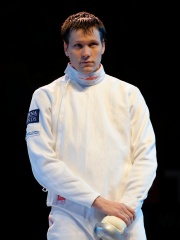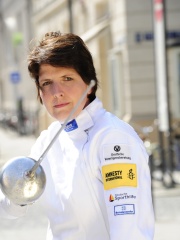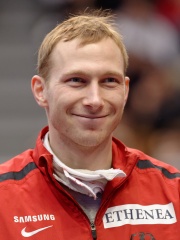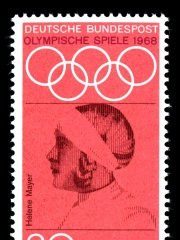
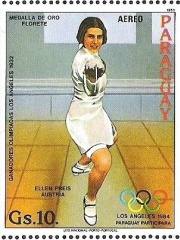
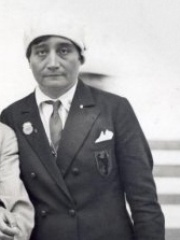

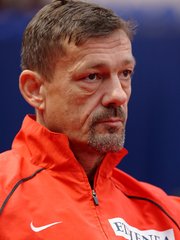

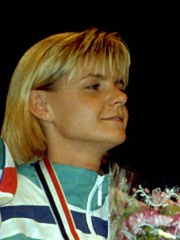
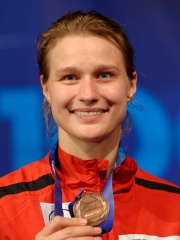
The Most Famous
FENCERS from Germany
This page contains a list of the greatest German Fencers. The pantheon dataset contains 349 Fencers, 20 of which were born in Germany. This makes Germany the birth place of the 8th most number of Fencers behind United States, and South Korea.
Top 10
The following people are considered by Pantheon to be the top 10 most legendary German Fencers of all time. This list of famous German Fencers is sorted by HPI (Historical Popularity Index), a metric that aggregates information on a biography's online popularity. Visit the rankings page to view the entire list of German Fencers.

1. Helene Mayer (1910 - 1953)
With an HPI of 61.21, Helene Mayer is the most famous German Fencer. Her biography has been translated into 25 different languages on wikipedia.
Helene Julie Mayer (20 December 1910 – 10 October 1953) was a German fencer who won the gold medal at the 1928 Olympics in Amsterdam, and the silver medal at the 1936 Olympics in Berlin. She competed for Nazi Germany in Berlin, despite having been forced to leave Germany in 1935 and resettle in the United States because she was of Jewish descent. She studied at American universities, and later returned to Germany in 1952 where she died of breast cancer. Mayer had been called the greatest female fencer of all time, and was named by Sports Illustrated as one of the Top 100 Female Athletes of the 20th Century, but her legacy remains clouded. At the Olympics in Berlin, where she was the only German athlete of Jewish origin to win a medal, she gave the Nazi salute during the medal ceremony and later said it might have protected her family that was in labor camps in Germany. Some consider her a traitor and opportunist, while others consider her a tragic figure who was used not only by Nazi Germany but by the International Olympic Committee to prevent a boycott of the Games. After the Olympics, she returned to the United States and became a nine-time U.S. champion. She received citizenship in 1941 but returned to Germany in 1952. Mayer died the following year, leaving few interviews and little correspondence.

2. Ellen Preis (1912 - 2007)
With an HPI of 56.50, Ellen Preis is the 2nd most famous German Fencer. Her biography has been translated into 24 different languages.
Ellen Müller-Preis, née Preis, (6 May 1912 – 18 November 2007) was a German-born Austrian Olympic-champion foil fencer. In 1949, she was named Austrian female athlete of the year.

3. Olga Oelkers (1887 - 1969)
With an HPI of 55.16, Olga Oelkers is the 3rd most famous German Fencer. Her biography has been translated into 17 different languages.
Olga Oelkers (21 May 1887 – 10 January 1969) was a German foil fencer. She competed at the 1928 and 1936 Olympics and won a bronze medal in 1928, behind her teammate Helene Mayer who won gold. At the European championships Oelkers won a team gold medal in 1936, a silver in 1934, and a bronze in 1935. After retiring from fencing Oelkers became a housewife and raised five children.

4. August Heim (1904 - 1976)
With an HPI of 54.88, August Heim is the 4th most famous German Fencer. His biography has been translated into 16 different languages.
August Heim (13 March 1904 – 8 May 1976) was a German fencer. He won two bronze medals at the 1936 Summer Olympics.

5. Matthias Gey (b. 1960)
With an HPI of 48.16, Matthias Gey is the 5th most famous German Fencer. His biography has been translated into 15 different languages.
Matthias Gey (born 7 July 1960) is a German fencer. He won silver medals in the team foil events at the 1984 and 1988 Summer Olympics.

6. Ulrich Schreck (b. 1962)
With an HPI of 48.12, Ulrich Schreck is the 6th most famous German Fencer. His biography has been translated into 16 different languages.
Ulrich Schreck (born 11 March 1962) is a German fencer. He won a silver medal in the team foil event at the 1988 Summer Olympics and a gold in the same event at the 1992 Summer Olympics. He is now federal coach to the Germany men's foil team.

7. Arnd Schmitt (b. 1965)
With an HPI of 47.93, Arnd Schmitt is the 7th most famous German Fencer. Her biography has been translated into 20 different languages.
Arnd Schmitt (born 13 July 1965 in Heidenheim an der Brenz) is a German fencer and Olympic champion in the épée competition. He won a gold medal in the individual épée and a team silver medal at the 1988 Summer Olympics in Seoul. He received an Olympic gold medal in épée team in 1992. Schmitt was inducted into Germany's Sports Hall of Fame in 2016.

8. Anja Fichtel (b. 1968)
With an HPI of 44.04, Anja Fichtel is the 8th most famous German Fencer. Her biography has been translated into 21 different languages.
Anja Fichtel-Mauritz (born 17 August 1968, née Fichtel) is a retired German foil fencer. At the 1988 Summer Olympics in Seoul, she won in the individual and team competitions, and she won the individual competition of the World Championship in 1986 and 1990. She was winner of the World Championships in 1985, 1989, 1993 as a member of the national German team and second in team competition at the 1992 Summer Olympics. From 1986 until 1996 Fichtel held the title of German champion.

9. Britta Heidemann (b. 1982)
With an HPI of 43.59, Britta Heidemann is the 9th most famous German Fencer. Her biography has been translated into 27 different languages.
Britta Heidemann (born 22 December 1982) is a German épée fencer. In 2016, Heidemann became a member of the International Olympic Committee (IOC).
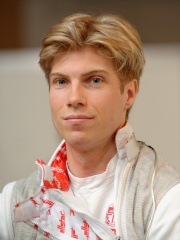
10. Peter Joppich (b. 1982)
With an HPI of 43.55, Peter Joppich is the 10th most famous German Fencer. His biography has been translated into 21 different languages.
Peter Joppich (born 21 December 1982) is a German foil fencer. He is a five-time World Champion in Foil with four Individual titles and one Team title. Joppich won the gold medal in 2010 World Fencing Championships after beating Lei Sheng 15–11 at Championnats du Monde, Paris. He was also the winner of the World Fencing Championships in St Petersburg in 2007 after beating Andrea Baldini 15–9, Turin in 2006 after beating Baldini 15–14, and Havana in 2003. He won his first World Championship Individual Title when he was just 21 years old. Joppich credits his success to former German fencer and Olympic gold medallist Ulrich Schreck. For more than 10 years, Schreck instructed Joppich during the latter's training at the Federal Training Centre in Bonn. He has competed in five Olympic Games – Athens 2004, Beijing 2008, London 2012, Rio de Janeiro 2016, and Tokyo 2021. He finished sixth, fifth, eleventh, and twelfth respectively.
People
Pantheon has 20 people classified as German fencers born between 1887 and 1992. Of these 20, 16 (80.00%) of them are still alive today. The most famous living German fencers include Matthias Gey, Ulrich Schreck, and Arnd Schmitt. The most famous deceased German fencers include Helene Mayer, Ellen Preis, and Olga Oelkers. As of April 2024, 3 new German fencers have been added to Pantheon including Matthias Gey, Ulrich Schreck, and Sabine Bau.
Living German Fencers
Go to all RankingsMatthias Gey
1960 - Present
HPI: 48.16
Ulrich Schreck
1962 - Present
HPI: 48.12
Arnd Schmitt
1965 - Present
HPI: 47.93
Anja Fichtel
1968 - Present
HPI: 44.04
Britta Heidemann
1982 - Present
HPI: 43.59
Peter Joppich
1982 - Present
HPI: 43.55
Sabine Bau
1969 - Present
HPI: 43.39
Jörg Fiedler
1978 - Present
HPI: 43.28
Benjamin Kleibrink
1985 - Present
HPI: 43.14
Imke Duplitzer
1975 - Present
HPI: 41.96
Sebastian Bachmann
1986 - Present
HPI: 38.37
André Weßels
1981 - Present
HPI: 37.20
Deceased German Fencers
Go to all RankingsHelene Mayer
1910 - 1953
HPI: 61.21
Ellen Preis
1912 - 2007
HPI: 56.50
Olga Oelkers
1887 - 1969
HPI: 55.16
August Heim
1904 - 1976
HPI: 54.88
Newly Added German Fencers (2025)
Go to all RankingsMatthias Gey
1960 - Present
HPI: 48.16
Ulrich Schreck
1962 - Present
HPI: 48.12
Sabine Bau
1969 - Present
HPI: 43.39
Overlapping Lives
Which Fencers were alive at the same time? This visualization shows the lifespans of the 4 most globally memorable Fencers since 1700.


